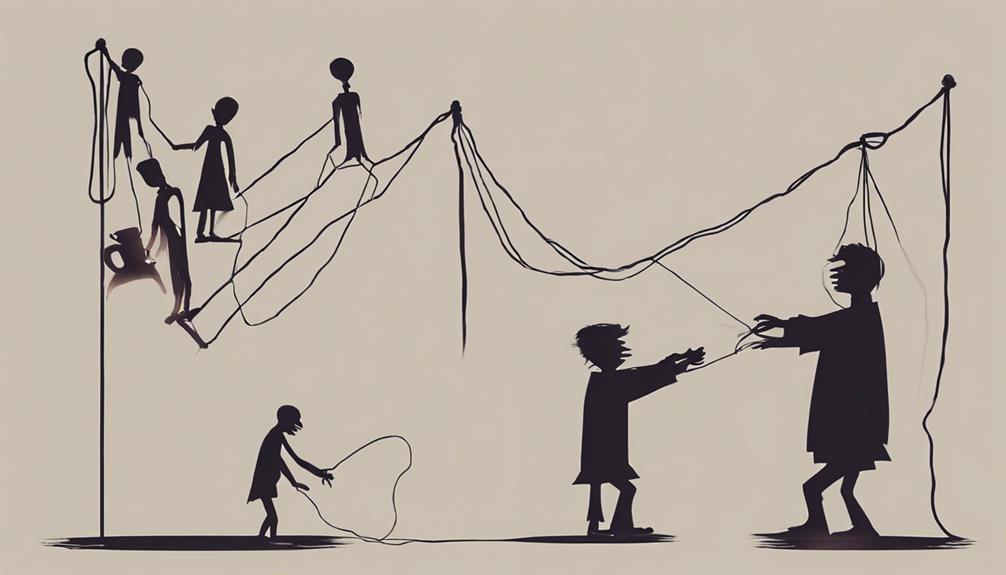Uncover the insidious tactics of persuasion that lurk beneath the surface, manipulating your thoughts and decisions without your conscious realization. Subliminal cues bypass your awareness, influencing consumer choices and political opinions. Covert techniques exploit fears and desires, blurring ethical boundaries. Subtle triggers alter behavior through strategic placements and emotional priming. Stand vigilant against hidden agendas that may not align with your best interests. Stay tuned to understand the impact of these powerful psychological tools and how to safeguard your decision-making process.
The Power of Subliminal Influence
Explore the insidious effectiveness of subliminal influence in manipulating behaviors and decisions. Hidden triggers and subconscious nudges are tools used to exert covert influence over individuals, leading to a profound psychological impact.
These subtle cues bypass conscious awareness, allowing manipulators to shape perceptions and sway decisions without the target realizing it.
By embedding messages or images within advertisements, videos, or even music, manipulators can plant suggestions directly into the subconscious mind. These subliminal elements then work beneath the surface, influencing thoughts and behaviors in ways that the individual may not consciously recognize.
This form of covert influence can be especially potent because it operates beyond the realm of conscious control, making it challenging to resist.
The psychological impact of subliminal influence extends to various aspects of human behavior, including consumer choices, political opinions, and even interpersonal interactions.
Being aware of these hidden tactics can help you better navigate the sea of manipulation that surrounds us, empowering you to make more informed decisions and guard against subconscious manipulation.
Unconscious Manipulation Techniques
How do manipulators utilize unconscious manipulation techniques to influence behaviors without your awareness?
By tapping into psychological triggers and hidden agendas, they can subtly exert covert influence over your decisions and actions. These tactics are designed to operate beneath your conscious awareness, making it challenging for you to detect their presence.
Manipulators may exploit your subconscious desires or fears to steer you towards a particular outcome without your explicit consent.
By leveraging these psychological triggers, they can nudge you in a certain direction while masking their true intentions. This form of manipulation raises ethical concerns as it bypasses your rational decision-making processes, potentially leading you to act against your best interests.
Being vigilant against unconscious manipulation techniques involves staying mindful of your own vulnerabilities and questioning the motives behind persuasive attempts.
Impact of Covert Persuasion
Manipulators' use of covert persuasion can have far-reaching consequences on your decision-making process and autonomy. When hidden agendas are at play, the psychological impact of covert tactics can be profound. Here's a glimpse into the impact of covert persuasion:
- Hidden Agendas: Manipulators often have hidden motives or agendas when using covert persuasion techniques. These hidden agendas may not align with your best interests, leading you to make decisions that benefit the manipulator rather than yourself.
- Psychological Impact: Covert persuasion can manipulate your thoughts and emotions, influencing you in ways you may not even realize. This can lead to feelings of confusion, doubt, and a loss of confidence in your judgment.
- Ethical Implications: The use of covert tactics raises ethical concerns about the boundaries of persuasion. It can blur the lines between genuine influence and manipulation, posing a threat to your autonomy and freedom of choice. Be vigilant against such tactics to safeguard your decision-making process.
Subtle Ways to Alter Behavior
Discover how subtle cues and influences can subtly alter behavior without your conscious awareness. Subtle ways to alter behavior often involve tapping into subconscious triggers that prompt behavior modification without individuals realizing it.
For instance, strategic placement of products in a store can subconsciously guide you towards making specific purchasing decisions. The colors used in advertisements or product packaging can evoke certain emotions, influencing your choices without you even recognizing it.
Subtle alterations in language or phrasing can also impact behavior. For example, using words like 'limited time offer' can create a sense of urgency, prompting you to act quickly without fully considering the decision.
Even the presence of certain scents in a store can affect your behavior, influencing your mood and purchasing habits.
Unveiling Hidden Psychological Triggers
Uncovering the hidden psychological triggers that influence human behavior sheds light on the powerful impact of subconscious cues. These hidden triggers are subtle yet potent forces that can sway decisions and alter behaviors without individuals even realizing it. Understanding the depths of subconscious persuasion is crucial in grasping how individuals can be influenced without their conscious awareness.
- Emotional Priming: Certain words, images, or sounds can evoke specific emotions, triggering responses that influence decision-making processes.
- Scarcity Mentality: Creating a sense of limited availability can drive individuals to act quickly out of fear of missing out, tapping into their subconscious fear of loss.
- Social Proof: People tend to follow the actions of others when uncertain, making social validation a powerful hidden trigger that influences behavior.
Recognizing and acknowledging these hidden triggers can empower individuals to make more informed choices and resist manipulation through subconscious persuasion. By shedding light on these covert influences, individuals can better navigate the complex landscape of persuasive tactics.
Ethical Concerns in Persuasion Strategies
Exploring the ethical implications of persuasive tactics reveals the importance of considering moral boundaries in influencing human behavior. When delving into the realm of persuasion strategies, it becomes evident that ethical dilemmas and moral implications often arise. One of the primary concerns is the manipulation of individuals through deceptive or coercive means. This raises questions about the transparency and honesty of the communicator's intentions.
Moreover, the use of emotional manipulation to sway individuals' opinions or actions can lead to ethical dilemmas regarding respect for autonomy and personal freedom. Persuasion strategies that exploit vulnerabilities or capitalize on fear can be particularly concerning from an ethical standpoint. It's crucial to recognize the potential harm that these tactics may inflict on individuals' well-being and decision-making processes.
As you navigate the complex landscape of persuasion strategies, it's essential to reflect on the ethical dilemmas that may arise and consider the moral implications of your actions. Striving to uphold ethical standards and respect individuals' autonomy can help mitigate the negative effects of persuasive tactics on vulnerable populations.
Unintended Consequences of Manipulation
Be mindful of the unintended consequences that may arise from manipulative persuasion tactics. While the immediate goal of using manipulation might seem beneficial, the long-term effects can lead to a variety of issues that weren't initially intended.
Some of these unintended consequences include:
- Erosion of Trust: Manipulative tactics can erode trust between individuals or within a group, as people may start questioning one another's motives and intentions.
- Reputation Damage: Employing manipulation to achieve personal gains can result in damaging your reputation when others uncover your hidden agendas.
- Resentment and Discord: Unintended consequences of manipulation can breed resentment and discord among those who feel manipulated, leading to strained relationships and negative interactions.
Conclusion
Now that you've explored the hidden world of persuasion tactics, remember that knowledge is power.
Just like a skilled magician reveals the secrets behind their tricks, understanding these techniques can help you resist manipulation and make informed decisions.
Stay vigilant, as the shadows of influence lurk around every corner, ready to cast their spell.
Dr. John Renoldson is a distinguished professor of Clinical Research Hypnotherapy He holds a PhD in Clinical Psychology and specializes in hypnotherapy and scientific research to enhance therapeutic outcomes. Dr. Renoldson has authored numerous peer-reviewed articles on the efficacy of hypnosis in treating conditions.




